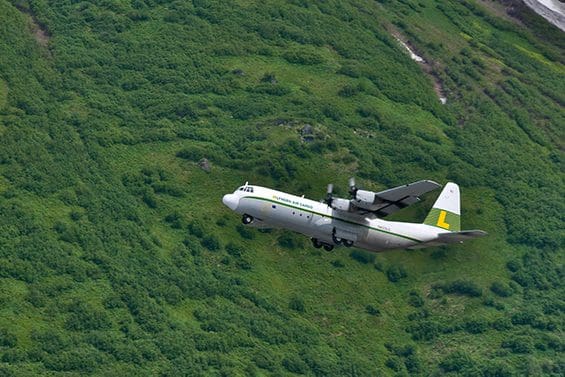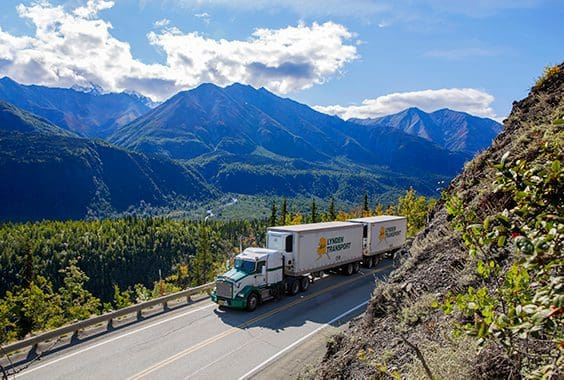Need help? Our experts are ready to find the solution you need.
Shipping throughout the United States
East Coast to West Coast, Canadian border to Mexican border, Lynden has the Lower 48 states covered. We have offices, operations or partners spread across the country, giving us the experience, knowledge and contacts to handle shipping throughout the United States. With our diverse combination of companies, we can fly, barge or truck just about anything to anywhere in the U.S.



Our major West Coast gateways in Seattle and Los Angeles give you flexibility to ship your products inside or outside the country with additional gateways in Chicago, Houston, Nashville, Atlanta and Miami. Whether you need it there in hours, days or weeks, Lynden has the national connections to make sure your freight is compliant with permits, policies and regulation from state to state.
Using our National Dispatch program, we can arrange for your shipment to be sent to the Pacific Northwest or Alaska from anywhere in the U.S. and Canada. Lynden will arrange all the transportation using the most dependable carriers at competitive rates.
Every shipment includes Lynden’s free online EZ Commerce system for tracking, tracing and reporting as well as other helpful online tools.


Common Questions
It means you are shipping between the 48 adjoining states on the North American continent excluding Hawaii and Alaska.
The bill of lading, freight bill and the Free On Board (FOB) terms of sale.
- Bill of lading is the most important document used in the transport of goods. The legal definition of a bill of lading is a contract for the carriage of goods and a document of title to them. It includes:
- Common carrier liability – the carrier is liable for loss and damage of the goods being transported, except if the goods were improperly packed by the shipper or if the goods themselves would be liable to a normal loss such as evaporation. The carrier is not liable for acts of God, public enemy or public authority.
- Delay in transport – the carrier cannot be held liable if the loss or damage is due to a delay in the transportation of the goods.
- Freight not accepted – if the goods are not accepted within the time allocated, the carrier can store the goods at a cost to the owner.
- Extraordinary value – the carrier is not liable and does not have to carry items of extraordinary value that are not in the published classifications or tariffs unless a special agreement with the shipper has been negotiated.
- Explosives – the carrier must be given full written disclosure when they are shipping dangerous/hazardous material, otherwise they are not liable for any losses.
- Recourse – the carrier cannot make additional charges to the shipper after making a delivery.
- Substitute bill of lading – if the bill is a substitute or exchange for another bill of lading then the current bill of lading must include all the clauses from previous documents.
- Alterations – the carrier must not make any changes or additions.
- Claims – this clause specifies the details of who to file a claim against and the time period after delivery in which the claim will be accepted.
- A freight bill is the carrier’s invoice to the shipping for all charges that the carrier has incurred. The bill includes details of the shipment, the items being shipped, the consignee, origin and destination and total weight and total charges.
Free On Board (FOB) terms of sale documents specify which party is liable for the transportation costs, which party is in control of the movement of the goods and when the title passes to the buyer. For example, if FOB Delivered is the term of sale, it implies the shipper will be responsible for all the carrier’s costs. If they are FOB Origin, the buyer takes the title of the goods when they are shipped and pays for all transportation charges/costs.
Parcel – also known as small package, with limited box dimensions and weight.
Expedited – is most often for time-sensitive or valuable shipments in which freight must be delivered within a specific time frame. It can be moved via:
- Air – which is most expensive, typically moving on airplanes with defined time frames. Air can be utilized when moving goods to Alaska and Hawaii.
- Truck – which means the freight moved rarely stops along the way to deliver or to pick up additional shipments along the way.
LTL shipping – stands for “less than truckload” and is used when freight does not require a full trailer or a direct route from A to B. Loads may include bulky or unique items or dense, tightly palletized freight. There are typically more stops and transfers along the route.
FTL – means full truckload. It is the ideal method with the contiguous states if you have a large shipment that will fill an entire trailer or at least exceed the volume for LTL options. Typically the truck moves direct from point A to B, making transit times shorter. Truckload can also encompass specialty transportation like tankers, flatbeds or materials that cannot be shipped with other materials such as hazardous chemicals.
Barge/Ocean – can be utilized for shipments moving to Alaska and Hawaii. The transit time is longer but most cost effective for shipments LCL (less than container load) FCL (full container load) and Breakbulk (shipments that can’t fit into a container such as pipes, lumber, etc.).
Intermodal – often used when a combination of air, truck, barge/ship or rail is needed.
Additional Materials
We have the equipment experience solutions for your freight needs!
Get a Quote
Submit a request to receive a personalized quote from one of our freight professionals.
Schedule a Shipment
Complete our form to schedule a shipment. Include your quote number if you have one.